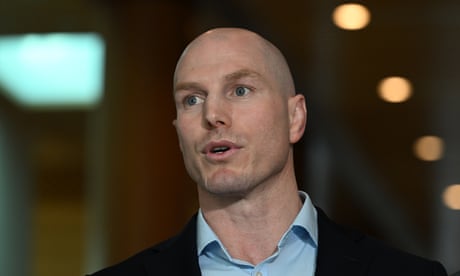- by foxnews
- 04 Apr 2025
‘We’re desperate’: David Pocock town hall hears pleas to pass industrial relations bill
‘We’re desperate’: David Pocock town hall hears pleas to pass industrial relations bill
- by theguardian
- 17 Nov 2022
- in news

So much of politics is what occurs between elections - not what politicians say when they are asking for your vote, but how they listen, and whether they can balance competing demands.
Senator David Pocock is a good listener - at ease fielding questions at the Gunghalin Theatre in the ACT on Wednesday, his third town hall since he was elected in May.
But balance is much harder, especially on the topic this evening: Labor's industrial relations bill. The independent says he agrees with most of it, but still has some concerns.
Pocock serves a territory of more than 400,000 residents with the earnestness of a teal MP. Elected on the same platform as the other Climate 200-supported candidates (climate, integrity, women), Pocock faces his biggest early policy test in an area that barely featured in their campaigns.
Pocock has gathered constituents to ask questions about the secure jobs, better pay bill, with the workplace relations minister, Tony Burke, on hand to answer the thornier ones about the problems with the Fair Work Act it seeks to update.
Burke's set piece is a redux of his National Press Club address from earlier on Wednesday. He's honed the stump speech to focus on the "single-interest" bargaining stream, the most contentious part of the bill, which Pocock has proposed be dealt with next year.
Burke argues that it isn't just the low-paid who need a wage rise so this section, aimed at those on middle incomes, can't wait either.
A cleaner asks Pocock a question about the need for multi-employer bargaining to prevent employers undercutting each other on wages - exactly the argument Burke delivered to argue against splitting the bill.
The plea for Pocock to vote for the bill, concluding with the observation "we're desperate", earns the biggest applause of the evening - either an element of coordination among union members, or a spontaneous upwelling of support.
Pocock gives his most passionate answer of the evening - but not about industrial relations. He pivots to the cost of living, arguing "wages are just part of it", and calling for a conversation about the cost of housing.
"What is housing for? Is it something to invest in - or is it a human right?"
The audience also contained a baggage handler and a seafarer - two other occupations at the frontline of some of Australia's most fiercely contested industrial relations disputes - giving the crowd the unreal air of a well-stacked Q+A audience.
The seafarer asks if Pocock will vote for the bill to "prevent manipulation and abuse by bosses".
"I'm not there yet," Pocock responds. At other times he phrases his position as "I couldn't at the moment", but that the bill would "pass on Monday" if the single-interest stream were removed and other concerns addressed about the union veto on putting proposed pay deals to a vote.
A former grocery worker wants Pocock to commit to not watering down the Better Off Overall Test - outflanking the Labor bill on the left, concerned it could result in pay cuts.
Earlier, Burke accepted that an amendment will likely be required to prevent employers structuring agreements that allow them to hire new workers on lower pay than those who signed up to the deal.
This and Pocock's concerns, including what size of business qualifies as a small business exempted from multi-employer bargaining, will be dealt with through the Senate inquiry process.
Pocock grumbles that witnesses have barely had time to put together submissions, and flashes up a slide showing the compressed timeline for consideration of the bill.
He also says there is a lack of "nuance" in the way the bill is debated online, a sign of the pressure on him to pass it transmitted through social media.
Perhaps Pocock's vote will be decided by process, or perhaps by the outcomes of amendments or unrelated cost of living issues - like the ACT's public housing debt.
Or perhaps it will be values. The baggage handler wants to know about Pocock's experience in the player's union as a professional rugby player.
Pocock says the union was instrumental in driving better pay and conditions and he would "hate to think what would happen" without representation, collective action and voice.
"That's why I'm so supportive of the majority of the bill," he says.
The only question is how he will deal with the balance.
- by foxnews
- descember 09, 2016
'I traveled for an entire year for free - and saved $15K'
Hailey Learmonth explored Australia without paying rent, thanks to pet sitting. She saved $15,000, lived on farms, and embraced remote work to travel on a budget.
read more


